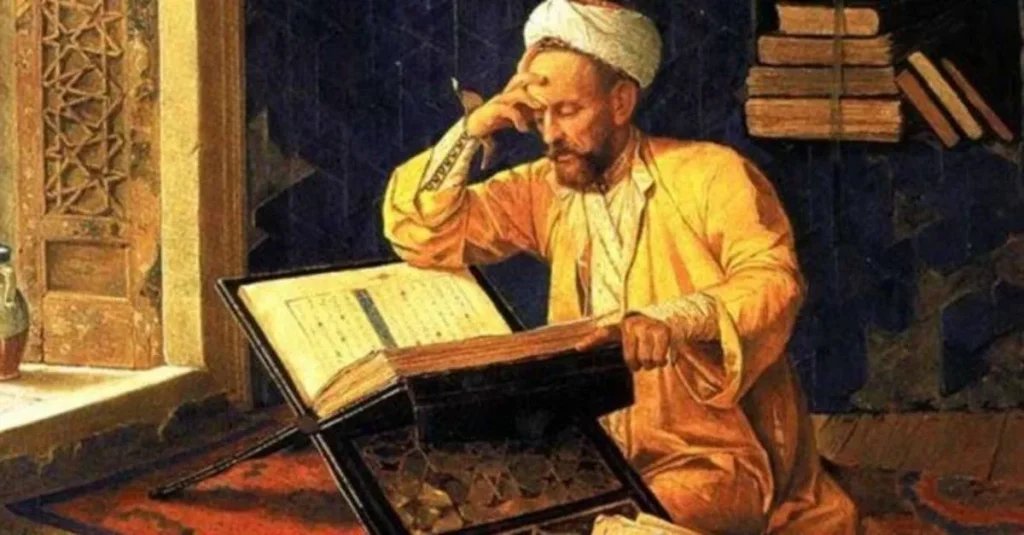
A of portrait of Imam Al-Ghazali
The Quest for Truth: “How Do We Know?”
Imam Al-Ghazali (رحمه الله) devoted much of his work to understanding truth. He asked, “How do we know reality?” Humans often rely on senses [1]. But senses can deceive. Perception alone cannot guarantee knowledge [2].
Reason, Al-Ghazali explained, is a necessary guide [1]. Logic helps organize information. But reason without insight can lead to error [3]. True understanding combines intellect and spiritual awareness [1].
He emphasized the importance of revelation. Sacred texts provide guidance beyond human reasoning [2]. Al-Ghazali argued that divine knowledge complements human inquiry [1]. Faith and intellect together form a complete approach to truth [3].
Observation of the world also aids understanding [2]. Al-Ghazali encouraged reflection on nature and human life. Patterns in creation reveal the wisdom of God [1]. Contemplation strengthens both knowledge and spiritual insight [3].

Imam Al-Ghazali also warned against blind imitation. Accepting ideas without investigation leads to error [2]. One must question, analyze, and seek evidence [1]. Knowledge requires effort, discipline, and sincerity of intention [3].
Ultimately, the quest for truth is both intellectual and spiritual [1]. Al-Ghazali urged seekers to purify the heart and mind. Self-reflection, study, and devotion guide one to ultimate understanding [2].
The journey is lifelong. Truth is not merely theoretical. It transforms character and actions [3]. The seeker learns patience, humility, and discernment. Al-Ghazali’s guidance continues to inspire thoughtful inquiry today [1].
References:
- Al-Ghazali, Deliverance from Error (Al-Munqidh min al-Dalal), 11th century.
- Fakhry, Majid, A History of Islamic Philosophy, Columbia University Press, 2004.
- Hourani, George, Islamic Thought in the Classical Age, Cambridge University Press, 1983.
The Path of Guidance
Imam Al-Ghazali (رحمه الله) believed that every seeker needs guidance to achieve spiritual and moral success [1]. Guidance begins with sincerity. Without true intention, no learning or effort bears lasting fruit [2].
He emphasized following knowledgeable and righteous teachers. A mentor helps the seeker navigate challenges [1]. Observing their behavior teaches more than theory alone [3].
Imam Al-Ghazali taught that the heart must be purified before seeking higher knowledge. Love, humility, and patience are essential [2]. Inner purification prevents ego and desire from distorting understanding [1].
He outlined a gradual path of spiritual development. Practices include prayer, meditation, and reflection on life’s purpose [2]. Small steps taken consistently build strong character and insight [3].
The seeker must combine knowledge, devotion, and ethical action. True guidance is not only learning but living according to principles [1]. Actions aligned with values strengthen both intellect and spirit [2].
Imam Al-Ghazali also warned against shortcuts. Spiritual transformation requires discipline and perseverance [3]. Those who rush may become proud or misguided [1]. Patience ensures sustainable growth and wisdom [2].
Finally, guidance is lifelong. Even advanced seekers need continual self-assessment and humility [3]. Al-Ghazali reminded followers that God’s mercy and direction are always essential [1].
References:
- Imam Al-Ghazali, Ihya’ Ulum al-Din, Book of Knowledge and Self-purification.
- Fakhry, Majid, A History of Islamic Philosophy, Columbia University Press, 2004.
- Hourani, George, Islamic Thought in the Classical Age, Cambridge University Press, 1983.
Contributions to Islamic Philosophy and Theology
Imam Al-Ghazali (رحمه الله) is regarded as one of the greatest Islamic philosophers and theologians [1]. He bridged faith and reason. His work clarified complex theological concepts for both scholars and laypeople [2].
He challenged excessive reliance on pure rationalism. Philosophers, according to Al-Ghazali, sometimes ignored moral and spiritual truths [1]. His critique in Tahafut al-Falasifa highlighted the limits of philosophy [3].
Al-Ghazali defended the principles of Islam through rational argument. He reconciled revelation with logical reasoning [2]. This approach strengthened the intellectual foundation of Islamic theology [1].
He emphasized the importance of ethics in philosophical inquiry. Knowledge should serve moral and spiritual development [2]. Al-Ghazali argued that wisdom without virtue leads to arrogance [3].
His contributions also include refining Sufi thought. He integrated mystical practices with scholarly rigor [1]. This made spirituality accessible while maintaining theological orthodoxy [2].
Al-Ghazali influenced later Islamic philosophers and theologians. Scholars studied his methods of argumentation and spiritual guidance [3]. His legacy continues to shape Islamic intellectual and religious life today [1].
References:
- Al-Ghazali, Tahafut al-Falasifa (The Incoherence of the Philosophers), 11th century.
- Fakhry, Majid, A History of Islamic Philosophy, Columbia University Press, 2004.
- Hourani, George, Islamic Thought in the Classical Age, Cambridge University Press, 1983.
The Study of the Qur’an and Hadith
Imam Al-Ghazali (رحمه الله) devoted much of his life to the study of the Qur’an and Hadith [1]. He believed that deep understanding of scripture is essential for spiritual growth [2].
He emphasized careful reading and reflection on the Qur’an. Memorization alone is insufficient [1]. Understanding context, meaning, and implications guides proper action [3].
Al-Ghazali also stressed the study of Hadith. The sayings and practices of the Prophet (صلى الله عليه وسلم) clarify principles of ethics and law [2]. He encouraged verifying authenticity and understanding the message [1].
He combined scholarly rigor with spiritual insight. Studying scripture is both intellectual and devotional [3]. Knowledge of the Qur’an and Hadith refines character and strengthens faith [2].
Al-Ghazali also warned against superficial learning. Reading without reflection can lead to misunderstanding [1]. True study transforms both heart and mind [2]. It nurtures humility, patience, and moral excellence [3].
In essence, Al-Ghazali’s approach integrates knowledge, ethics, and devotion. The seeker is guided to act upon what is learned [1]. His methodology continues to influence Islamic education today [2].
References:
- Al-Ghazali, Ihya’ Ulum al-Din, Book of Knowledge and Learning.
- Fakhry, Majid, A History of Islamic Philosophy, Columbia University Press, 2004.
- Hourani, George, Islamic Thought in the Classical Age, Cambridge University Press, 1983.






